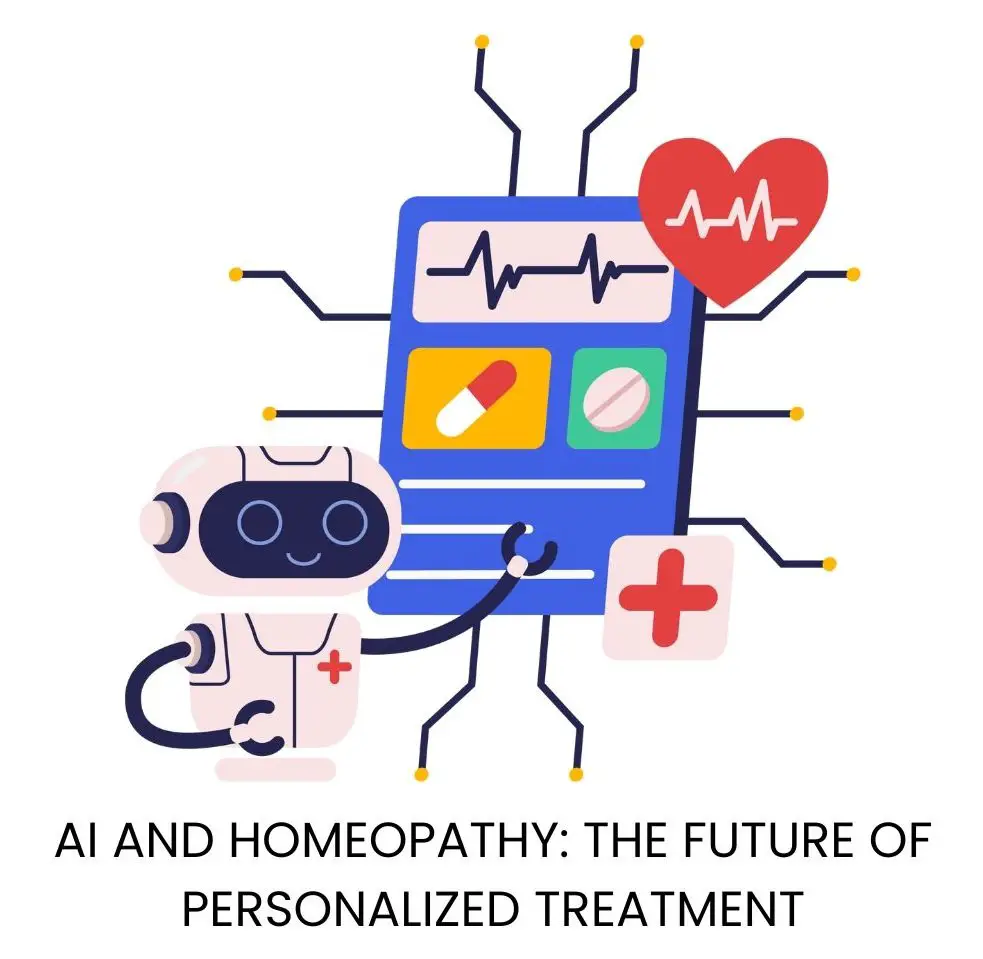As technology transforms every corner of healthcare, an exciting question arises: Can artificial intelligence (AI) enhance the deeply human, individualized world of homeopathy?
At first glance, homeopathy and AI may seem worlds apart — one based on centuries-old philosophies of healing, the other rooted in futuristic algorithms and data science.
But in reality, the intersection of AI and homeopathy may be one of the most promising developments in personalized healthcare today.
In this post, we’ll explore how AI is being integrated into homeopathy, what it means for practitioners and patients, and how it could shape the future of natural medicine.

Table of Contents
Toggle🌿 Why Personalization Is the Heart of Homeopathy
Homeopathy is built on the principle of treating the individual, not the disease.
Every patient is unique, and so is their remedy. A homeopath doesn’t just consider physical symptoms, but also mental, emotional, and constitutional traits.
However, as practitioners know, this level of detail can be time-consuming and mentally demanding.
Interpreting complex symptom pictures, matching rubrics, and choosing the correct remedy — it’s an art that takes years to master.
Enter AI.
HOW TO CHOOSE THE RIGHT HOMEOPATH: RED FLAGS & GREEN FLAGS
🤖 How AI Can Support Homeopathy
AI doesn’t replace the homeopath — it empowers them.
Here are ways AI is already making waves in the field:
1. Smart Repertorization Tools
AI-driven software can now analyze large amounts of symptom data quickly and match it with remedies using sophisticated logic.
Instead of sifting through hundreds of rubrics manually, AI can help narrow down possibilities in seconds.
Examples:
- AI-powered platforms that cross-reference patient language with rubrics
- Algorithms that weigh symptoms based on intensity, frequency, and hierarchy
This helps practitioners save time and reduce human error — without losing the essence of individualization.
2. Better Case Analysis & Pattern Recognition
AI excels at recognizing patterns, even in vast and complex datasets.
In homeopathy, this means:
- Spotting connections between mental and physical symptoms
- Identifying rare remedy pictures based on subtle patterns
- Recommending follow-ups or remedy changes based on historical case data
Imagine a virtual assistant that has read thousands of case studies and materia medica texts — and can recall and compare them instantly!
3. Enhanced Patient Intake
AI tools can guide patients through smart questionnaires that dynamically adapt based on answers.
This ensures that no key information is missed and helps even new practitioners gather deep, useful case data.
Some platforms can even translate patient language into clinical symptoms, improving accuracy for both in-person and remote consultations.
4. Personalized Remedy Suggestions
AI can learn from past successful cases, feedback, and remedy responses to make more refined remedy suggestions over time.
It could also adapt based on:
- The patient’s Miasmatic tendencies
- Temperament
- Reactional modes
- Remedy relationships
This brings us closer to precision homeopathy, where remedies aren’t just selected from a repertory, but from a dynamically evolving, intelligent system tailored to the individual.
5. Remote & Accessible Care
AI-driven homeopathy apps can expand access to homeopathic care in underserved areas. Patients can input symptoms, receive suggestions, and connect with practitioners virtually.
This doesn’t replace the human element — it supports patients and practitioners by bridging gaps in geography, language, and time.
🧠 Will AI Replace Homeopaths?
Absolutely not.
Homeopathy is an art as much as it is a science.
It requires intuition, empathy, and deep human insight.
AI cannot replicate the healing presence of a homeopath or the subtle, energetic understanding required in remedy selection.
But what AI can do is:
- Enhance decision-making
- Reduce time spent on repetitive tasks
- Expand access to knowledge
- Help new practitioners grow more confidently
Think of AI as your digital apprentice — one that’s fast, tireless, and learns continuously.
🔍 What Are the Limitations?
Of course, AI isn’t perfect. It has limitations that homeopaths must be aware of:
- Context Matters: AI may misinterpret symptoms without the full human story.
- Lack of Human Sensitivity: Emotional nuances or unspoken suffering may go unnoticed.
- Data Dependence: AI learns from existing data. If the data is flawed, biased, or incomplete, so are the outcomes.
- Over-Reliance Risk: Practitioners must avoid relying solely on AI recommendations and stay grounded in their clinical experience.
SCOPE AND LIMITATIONS OF HOMOEOPATHY
🧪 Real Examples in Action
Several startups and platforms are already combining AI and homeopathy:
- Vithoulkas Compass integrates data-backed suggestions with case-taking tools.
- HomeoAI is experimenting with symptom mapping using NLP (natural language processing).
- Apps are being developed where AI suggests remedies based on voice inputs or typed symptoms.
These are early days, but the movement is growing fast.
🧘🏽♀️ The Future of Holistic AI
The future lies in holistic AI — not just smart, but ethical, empathetic, and spiritually aware.
As AI evolves, we may see tools that:
- Learn from energetic shifts in patients
- Help track healing over time through behavioural patterns
- Suggest meditation, lifestyle tips, or supportive therapies alongside remedies
This aligns perfectly with homeopathy’s holistic ethos: treating the person, not just the pathology.
💬 Final Thoughts: Blending Tradition with Innovation
AI will never replace the soul of homeopathy — but it can amplify its reach, precision, and effectiveness.
As homeopaths, we’re at a beautiful crossroads:
💡 We carry forward centuries of healing wisdom.
🤝 We embrace innovation that can help us serve better.
The future of homeopathy is not threatened by AI — it’s enhanced by it.
Let’s use this technology wisely, consciously, and always in service of one thing: healing the human being in front of us.
